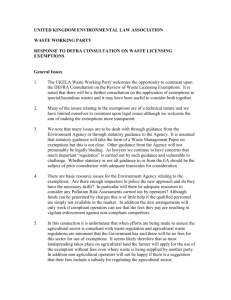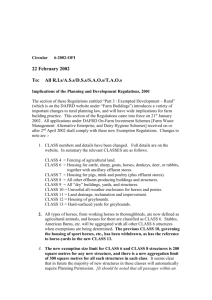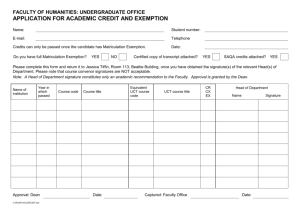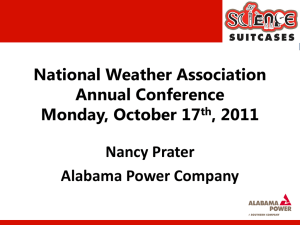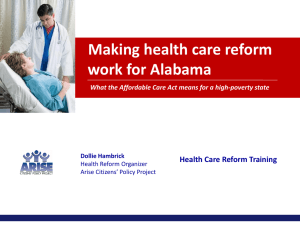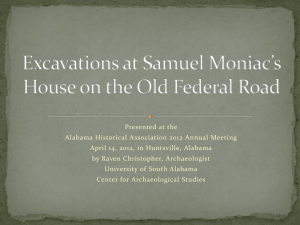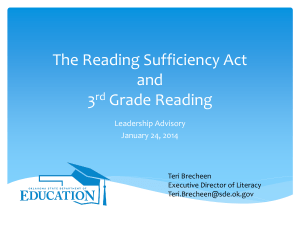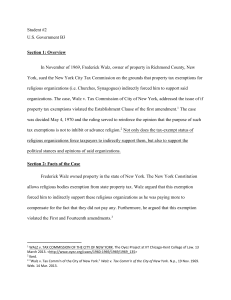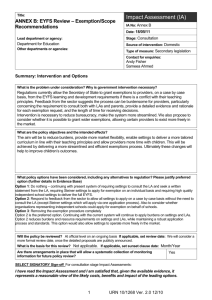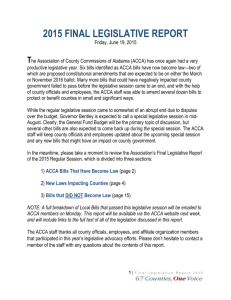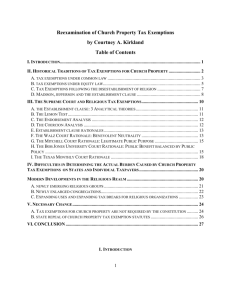Legislative Recap | Terri Sharpley Reynolds, ACCA Director of
advertisement
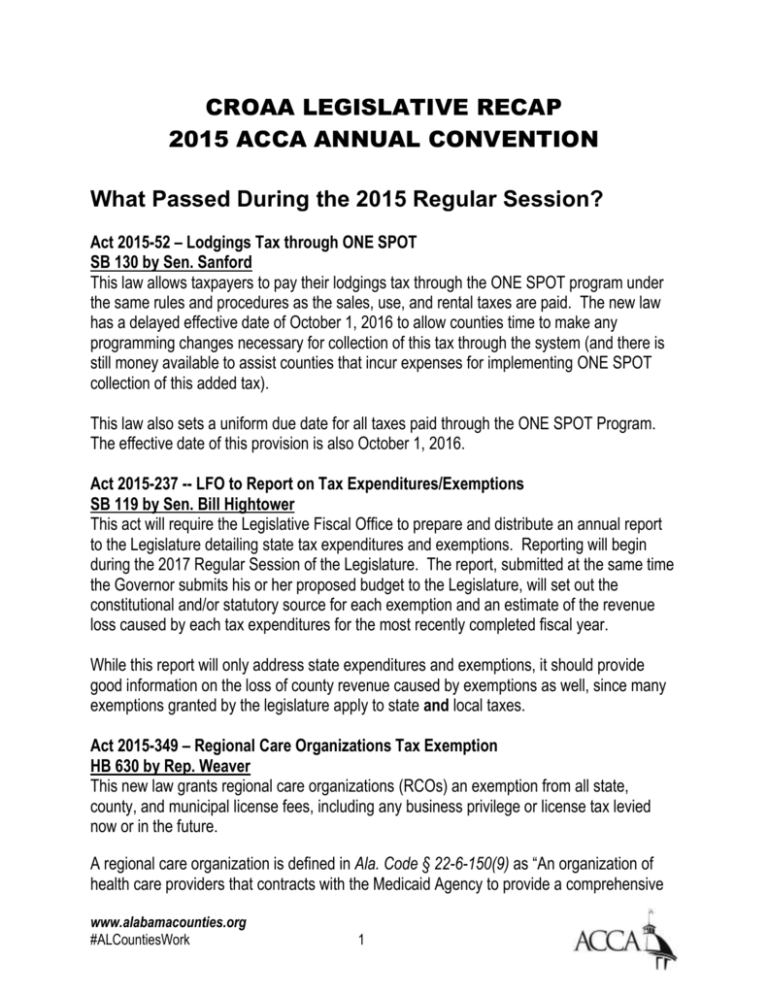
CROAA LEGISLATIVE RECAP 2015 ACCA ANNUAL CONVENTION What Passed During the 2015 Regular Session? Act 2015-52 – Lodgings Tax through ONE SPOT SB 130 by Sen. Sanford This law allows taxpayers to pay their lodgings tax through the ONE SPOT program under the same rules and procedures as the sales, use, and rental taxes are paid. The new law has a delayed effective date of October 1, 2016 to allow counties time to make any programming changes necessary for collection of this tax through the system (and there is still money available to assist counties that incur expenses for implementing ONE SPOT collection of this added tax). This law also sets a uniform due date for all taxes paid through the ONE SPOT Program. The effective date of this provision is also October 1, 2016. Act 2015-237 -- LFO to Report on Tax Expenditures/Exemptions SB 119 by Sen. Bill Hightower This act will require the Legislative Fiscal Office to prepare and distribute an annual report to the Legislature detailing state tax expenditures and exemptions. Reporting will begin during the 2017 Regular Session of the Legislature. The report, submitted at the same time the Governor submits his or her proposed budget to the Legislature, will set out the constitutional and/or statutory source for each exemption and an estimate of the revenue loss caused by each tax expenditures for the most recently completed fiscal year. While this report will only address state expenditures and exemptions, it should provide good information on the loss of county revenue caused by exemptions as well, since many exemptions granted by the legislature apply to state and local taxes. Act 2015-349 – Regional Care Organizations Tax Exemption HB 630 by Rep. Weaver This new law grants regional care organizations (RCOs) an exemption from all state, county, and municipal license fees, including any business privilege or license tax levied now or in the future. A regional care organization is defined in Ala. Code § 22-6-150(9) as “An organization of health care providers that contracts with the Medicaid Agency to provide a comprehensive www.alabamacounties.org #ALCountiesWork 1 package of Medicaid benefits to Medicaid beneficiaries in a defined region of the state and that meets the requirements set forth in [the law].” The exemptions granted in this law do not apply to the individual health care providers who are members of a regional care organization The law took effect on June 5, 2015 These regional care organizations were created pursuant to a 2014 law designed to provide Medicaid services to eligible persons on a regional basis across the state. The funds for operation of these RCOs is Medicaid revenue and the payment of license taxes, etc. was an additional charge against the financially-struggling program. The original bill exempted the payment of all taxes, but ACCA was able to negotiate for limiting the exemption to business licenses. Apparently, some of the municipal business licenses being assessed against these non-profit organizations threatened to cripple this new service delivery process. Act 2015-448 -- Simplified Sellers Use Tax Remittance SB 437 by Sen. Trip Pittman This act is designed to entice out-of-state retailers to voluntarily collect a substitute use tax of 8% on all items delivered into the state. Counties will receive 2% of all taxes collected under this program, with revenues distributed to all 67 counties based upon population. The option to participate in this program is only available for out-of-state sellers who have no connection with the state and no legal requirement to collect any state or local use tax otherwise due on the transaction. And any participating business will be subject to requirements of the law and ADOR rules, but will be “grandfathered” in should federal law on “internet sales tax” ever become law. The collection and remittance of this “simplified sellers use tax” will relieve both the seller and purchaser from the application of all state and local sales and use taxes on transactions, protection from audits by local governments based on this remittance, and assurance that use of the new system will not trigger any additional taxes or fees. And Alabama taxpayers will be allowed to request an annual refund of any “overpaid” use tax from the Department of Revenue in the event the local sales and use tax levied in their jurisdiction is actually lower than the 4% paid pursuant to this substitute tax. This law takes effect on October 1, 2015. www.alabamacounties.org #ALCountiesWork 2 What Didn’t Pass During the 2015 Regular Session? SB 322 by Sen. Sanford – Reporting Tax Rate Changes This bill was designed to make procedural changes in the process for letting the Alabama Department of Revenue know about new local taxes and/or rate changes in existing taxes. This bill was a priority for the Department and will surely be back in a future legislative session. The bill would require a locality to provide 60 days’ notice to the Department of a new or amended tax (current law is 30 days). The effective date of the change would be the first day of the third month following notification. Under the bill, the Department would send confirmation of the change to the locality and if the locality did not advise of an error in the notice received from the Department, the Department would not be responsible for any refund due the taxpayer in the event of an error in the posted tax rate. The Department would still be responsible if there is an error in the posted rate that conflicts with the information included in the confirmation sent to the locality. The Department worked closely with ACCA staff to ensure counties would not be penalized for mistakes made by the Department in implementing and posting local tax rates. This bill would also have clarified that no localities will be assessed a fee for use of the ONE SPOT system. The Department currently does not charge a fee pursuant to a court order, but wanted the provision to be clear under the law. Overview of the 2015 Special Session Act 2015-502 – Automated Sales Suppression Devices HB 18 by Rep. McMillan This act makes it illegal to sell, purchase, install or possess devices that are designed to falsify sales records. Under this law, the offending person(s) must generally be prosecuted within 3 years of commissioning (or discovery) of the offense; however, the law sets out a 6 year statute of limitation in instances involving the following: 1. 2. 3. 4. 5. Defrauding or attempting to defraud the State of Alabama; Attempting to evade or defeat any tax or the payment thereof; Willfully aiding or assisting in the preparation of a false tax return or claim, Willfully failing to pay any tax, or make a return; Offenses related to false statement and fraudulent documents (described in §40-29115); www.alabamacounties.org #ALCountiesWork 3 6. Offenses related to the intimidation of officers and employees (described in §40-29118); 7. Offenses related to the possession or use of automated suppression devices or phantom-ware (described in §40-29-121). Violations are punished as a Class C felony, which could lead to fines of up to $100,000 for individuals, and up to $500,000 for corporations. Senator Livingston offered an amendment to the bill on the Senate floor to ensure offending persons or corporations are liable for all taxes, fees, penalties, and interest due to the state or any locality impacted by the crime—giving counties a means to recover lost revenue due to the growing trend of sales suppression mechanisms. This law is currently in effect. Act 2015-503 – Automobile “Drive-Out” Tax HB 25 by Rep. K Johnson This act repeals the sales tax exemption granted to automobiles, trucks, truck trailers and semi-trailers purchased in Alabama that will be 1) registered or titled outside Alabama, and 2) exported or removed from the state within 72 hours of purchase. These vehicles will be subject to the Alabama automotive sales tax rate when this law goes into effect on January 1, 2016. This act exempts purchasers from out-of-state whose home state does not require Alabama residents purchasing a vehicle that will be titled or registered in Alabama to pay an automobile tax to that state. The Department of Revenue (DOR) will be required to publish on its website a list of states that do-not allow drive-out provisions to Alabama residents. If the DOR list is incorrect, the taxpayer will be relieved from liability for any miscollection of the automotive sales tax. Pending Signature by Gov. Bentley – Reporting Requirements for Non-Profits SB 24 by Sen. Pittman This act requires organizations that are exempts from paying sales, use, and lodging taxes to obtain an annual certificate of exemption from the Department of Revenue. It also creates certain reporting requirements for those organizations claiming state exemptions. The act does not apply to governmental entities, and it in no way impacts an organization’s federal tax-exempt status. Certificates of exemptions will be valid for one-year. Any person or organization that doesn’t www.alabamacounties.org #ALCountiesWork 4 obtain the annual certificate will not be allowed to make tax-exempt purchases. Under this new law, the Department of Revenue can assess any person or organization with state and local sales, use, and lodging tax for any transaction conducted without a proper certificate of exemption. Additionally, a person violating these provisions are subject to a civil penalty from the Department of Revenue in an amount not less than $2,000.00, or two-times the state and local sales, use, and lodging taxes due—whichever is greater. The Association’s general legislative position is to oppose any and all exemptions because they take money away from county general funds. While it is not clear how much revenue this new law will yield for counties, its intent is to curb abuse of those who might make personal purchases utilizing the tax exemption granted to the organization for which the person worked or volunteered. This act goes into effect for all tax exempt persons or organizations on January 1, 2016. NOTE: This Act is intended to be the “new-and-improved’ version of SB 245, which was introduced by Sen. Orr during the 2015 Regular Legislative Session. That bill would have provided that entities entitled to a state tax exemption would pay the tax and file annually for a refund of those taxes paid. The Department of Revenue (and many counties concerned that the bill would be expanded to include local taxes) expressed strong concerns about the administrative burdens this process would create, which led to the introduction of this ‘new’ version during the special session. www.alabamacounties.org #ALCountiesWork 5
